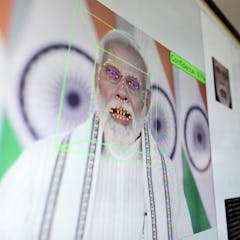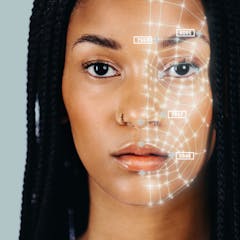Articles on Deepfakes

August 21, 2024
AI ‘nudify’ sites are being sued for victimising people. How can we battle deepfake abuse?
Within seconds, an app can turn anyone’s photo into an explicit image. The law is catching up to make this a criminal offence, but we need to do more.

August 5, 2024
The rise of the ‘machine defendant’ – who’s to blame when an AI makes mistakes?
As they improve, we’ll likely trust AI models with more and more responsibility. But if their autonomous decisions end up causing harm, our current legal frameworks may not be up to scratch.

June 12, 2024
What to do if you, or someone you know, is targeted with deepfake porn or AI nudes
Our survey of more than 16,000 people in ten countries found Australia had the highest rate of deepfake porn victims.

June 10, 2024
Deepfakes threaten upcoming elections, but ‘responsible AI’ could help filter them out before they reach us
Shweta Singh, Warwick Business School, University of Warwick
Technology could come to the rescue, protecting the integrity of elections.

June 10, 2024
Indian election was awash in deepfakes – but AI was a net positive for democracy
Vandinika Shukla, Harvard Kennedy School and Bruce Schneier, Harvard Kennedy School
Campaigns used deepfakes to connect with voters rather than deception, and AI also helped them break through language barriers.

May 29, 2024
What does AI mean for Australian democracy? And what can we do about it?
Zoe Jay Hawkins, Australian National University
Deepfakes and disinformation are on the rise as the world faces the ‘biggest election year in history’. But AI doesn’t have to spell the end of democracy.

May 23, 2024
Scarlett Johansson’s complaint to OpenAI is a new benchmark in the development of machine intelligence
David Reid, Liverpool Hope University
Scarlett Johansson said one of the five voices used for OpenAI’s new product sounded very like her.

May 1, 2024
National Cabinet has committed to a range of strategies to stop violence against women, but has it done enough?
Public focus on, and anger about, the horrifyingly high rates of violence against women is at fever pitch. What have the country’s leaders agreed to, and will it fix the problem?

April 18, 2024
Visualising the 1800s or designing wedding invitations: 6 ways you can use AI beyond generating text
There’s no escaping generative AI as it infiltrates our workplaces and daily lives. Learning what these tools can do will help you understand their full impact.

April 16, 2024
Deepfake detection improves when using algorithms that are more aware of demographic diversity
Siwei Lyu, University at Buffalo and Yan Ju, University at Buffalo
New research found a way to both improve the accuracy of deepfake detection algorithms while also enhancing fairness.

April 9, 2024
Deepfake porn: why we need to make it a crime to create it, not just share it
The invisible threat of deepfake porn now pervades the lives of women and girls

March 24, 2024
Addressing deepfake porn doesn’t require new criminal laws, which can restrict sexual fantasy and promote the prison system
Deepfake pornography raises questions about consent, sexuality and representation. The issue is more complicated than online misogyny — new criminal laws are not our best response.

March 19, 2024
Deepfakes are still new, but 2024 could be the year they have an impact on elections
As technology has advanced, AI-generated deepfakes have become more convincing.

March 18, 2024
AI vs. elections: 4 essential reads about the threat of high-tech deception in politics
Using disinformation to sway elections is nothing new. Powerful new AI tools, however, threaten to give the deceptions unprecedented reach.

March 12, 2024
Princess of Wales photo controversy shows we’ve been thinking about edited images the wrong way
Catherine is far from the first royal to experiment with photo editing.

March 4, 2024
Demand for computer chips fuelled by AI could reshape global politics and security
Kirk Chang, University of East London and Alina Vaduva, University of East London
The effects of AI’s growth on global security could be difficult to predict.

March 1, 2024
In 2024, we’ll truly find out how robust our democracies are to online disinformation campaigns
Low tech or hi-tech, the next year will determine how much action nations take on election interference.

February 25, 2024
So, you’ve been scammed by a deepfake. What can you do?
Deepfake scams are on the rise – but can their victims claim compensation? The legal landscape is still developing.

February 22, 2024
Deepfakes in South Africa: protecting your image online is the key to fighting them
Deepfakes are on the rise in South Africa and many people seemingly struggle to spot them.

February 21, 2024
What ‘psychological warfare’ tactics do scammers use, and how can you protect yourself?
Mike Johnstone, Edith Cowan University and Georgia Psaroulis, Edith Cowan University
With so much advice available, how are we still getting scammed? It’s because cybercriminals use sophisticated psychological techniques to trick us and wear us down.
Related Topics
- Artificial intelligence (AI)
- Audio deepfakes
- ChatGPT
- Disinformation
- Fake news
- Give me perspective
- Machine learning
- Misinformation
- Social media
- Technology
Top contributors
- Nicola Henry Professor & Australian Research Council Future Fellow, Social and Global Studies Centre, RMIT University
- Siwei Lyu Professor of Computer Science and Engineering; Director, UB Media Forensic Lab, University at Buffalo
- Anastasia Powell Professor, Family and Sexual Violence, RMIT University
- Joan Donovan Assistant Professor of Journalism and Emerging Media Studies, Boston University
- Hany Farid Professor of Computer Science, University of California, Berkeley
- Clare McGlynn Professor of Law, Durham University
- Dominic Lees Associate Professor in Filmmaking, University of Reading
- Bruce Schneier Adjunct Lecturer in Public Policy, Harvard Kennedy School
- Nadia Naffi Assistant Professor, Educational Technology, Chair in Educational Leadership in the Innovative Pedagogical Practices in Digital Contexts - National Bank, Université Laval
- Asher Flynn Associate Professor of Criminology, Monash University
- Kentaro Toyama Professor of Community Information, University of Michigan
- Nir Eisikovits Professor of Philosophy and Director, Applied Ethics Center, UMass Boston
- Christopher Schwartz Research scientist, Rochester Institute of Technology
- Matthew Wright Professor of Computing Security, Rochester Institute of Technology
- Audrey de Rancourt-Raymond Assistant researcher, Université du Québec à Montréal (UQAM)





















